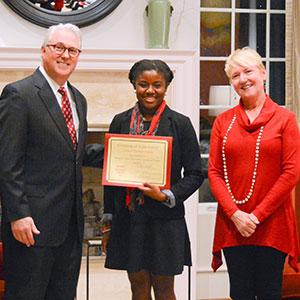Communications Intern O’Licia Parker-Smith

O’Licia Parker-Smith is in her second year as a communications intern in the Office for Institutional Equity and Diversity. O’Licia has been instrumental in building OIED’s Twitter presence, more than doubling the number of followers. She also writes for the Digest, provides event support as well as a much-needed student perspective on things.

What are your year and major, and where are you from?
I am a sophomore in Communications with a concentration in Public Relations, from Fayetteville, North Carolina.
Why and how did you decide to obtain an internship in OIED?
Through talking with Dr. Tracey Ray at the African American Student Symposium, I was introduced to an opportunity to gain experience with public relations work at the office she works in, the Office for Institutional Equity and Diversity. I thought this would be a great way to better understand the practices of public relations with the ability to learn techniques in a classroom and immediately be able to apply them through my internship.
What are some of the things you have worked on while in OIED?
I mainly focus on managing the social media accounts of the office and attending events that are held to live tweet and write review articles. I have also worked alongside other interns creating videos for the office to promote awareness of diversity and a sticker campaign that worked as visual marketing for OIED.
What is your favorite thing about working in OIED?
My favorite part would be the freedom I have to use my own style in accomplishing tasks. I also love the opportunities to attend exclusive events and meet influential people on and off NC State’s campus.
Why do you feel the work of OIED is important?
Diversity efforts are being talked about more frequently in today’s society but people need to know just what that means and how they can help because a lot of people still don’t fully understand. OIED helps bridge various audiences together to be able to learn in safe spaces about other cultures, identities and diversity efforts. Not only does this office allow these educational moments to take place, but there is also room for community-building to create relationships and appreciate diversity as well. No matter how much someone may want to ignore the issue, the truth is, you can’t run from diversity. I feel that people should learn now while there are resources available to help adequately educate and room for mistakes.
What do you think will be the next big challenges for colleges and universities to face in the areas of equity and diversity?
I think the next milestone we will all have to reach together is learning cultural competence. Cultural sensitivity is not complaining about diversity efforts or overreacting. I feel that it is so important today because in the past, groups who were being oppressed were not able to be a voice to the masses for injustices. Now, with the advancement of cross-cultural interaction and technology, more people have a voice. With that, these groups are educating people along with their allies on how things can be offensive and inappropriate. This is why more everyday issues are being addressed with this generation than with our parents or grandparents.
- Categories:


